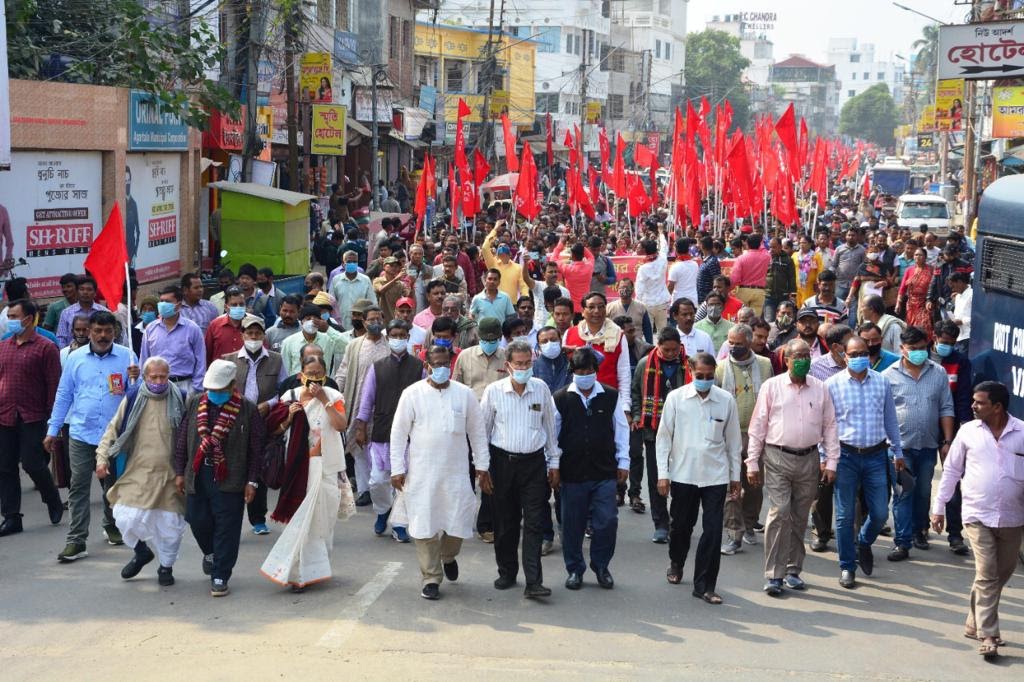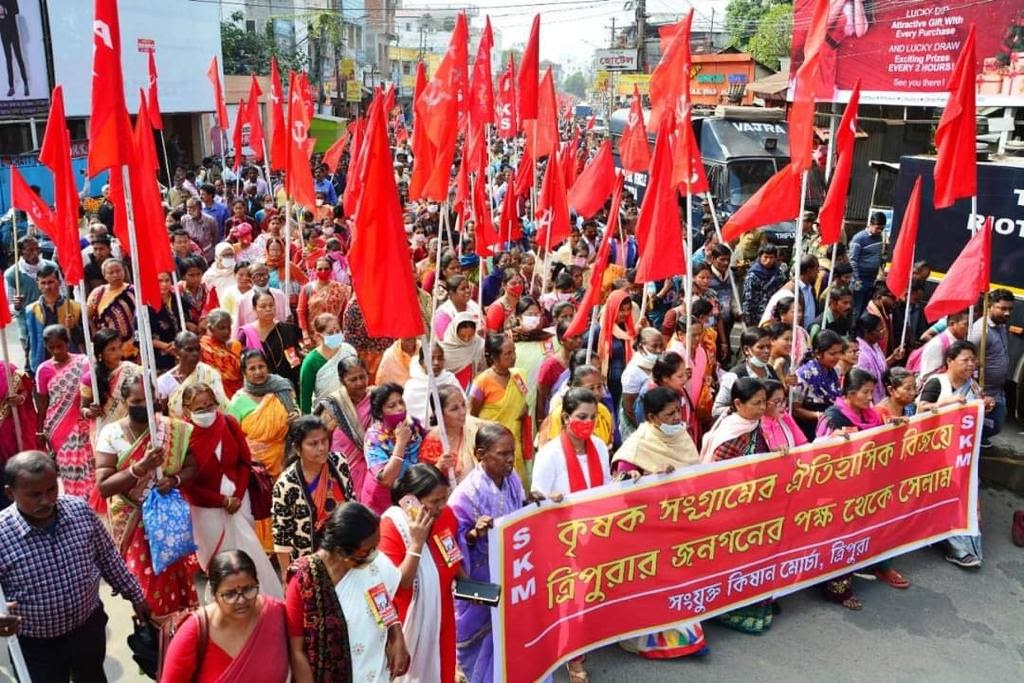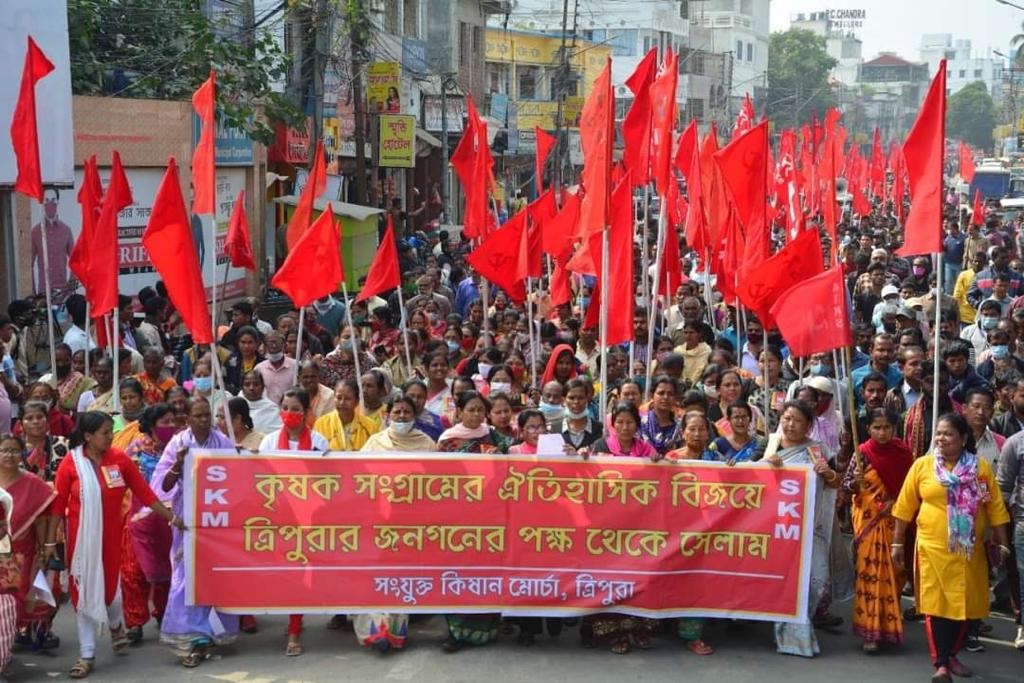Tripura: Farmers' Victory Rally Raises 10 Demands
Tripura locals pose 10 demands to BJP government through farmers' victory rally in Agartala

KOLKATA: What we are feeling today in this region, is that the provisions that were conceived or adopted in the 1950s, are not sufficient or adequate to meet the aspirations of the people.
A Farmers’ Victory rally was held in Agartala, Tripura on December 24, to celebrate the victory of the struggle and make demands of the BJP government for the peasantry of the State. The rally was about 15000 members strong, and lasted approximately three hours, with the procession lasting one hour with the rest of the time being dedicated to the meeting which was convened at Gandhighat near the city centre.
Pabitra Kar, member of CPI(M) and Secretary of the Tripura All India Kisan Sabha says, “The kisans are in a very distressed position.”
Kar explains that the previous government had made efforts to sustain the economy of Tripura through agriculture, for which various schemes were made available to the farmers. For the farmers situated in the plains, the SRI system (System of Rice Intensification) was introduced during this time.
“But after the coming of this government, they have not stopped it, yet there is no activity in the SRI systems,” he informs. “But there is no seed in the store. In the government stores there are no fertilisers or pesticides. There is nothing helping the farming community.” The schemes for vegetable cultivation have also been similarly abandoned. “One lakh farming families are involved in rubber cultivation. But for the last three years, there has been no extension program for rubber,” he adds.
Kar also mentions that previously the irrigation system in Tripura was very good. “But now 75 percent of the irrigation schemes are abandoned, due to minor repairing works - minor repairs have not happened in the last three years,” he tells The Citizen. Recounting a meeting with the Chief Engineer of the Irrigation program, he recalls being told that the reparinging sector for the Irrigation Department has had no funds for the past two-three years.

“Without irrigation, how can modern farming be done?” he asks. “About 40 to 50 percent of the fields remain vacant,” says Kar. Farmers are unable to use their land due to lack of resources and amenities.
Kar also makes a point to mention that the paddy procurement schemes are not benefiting the farmers at all, since the grains are first sold to middlemen, and only then reach the farming community.
“As an organisation we have been regularly pursuing the government,” Kar tells The Citizen, “But the departments are practically defunct. Most of the senior posts are vacant… It is in a horrible condition - the Agricultural Department of our state.”
Jitendra Chaudhury, President of the Ganamukti Parishad, explains the particular demands that the Adivasis of Tripura have for the government. According to the provision in the Sixth Schedule of the Indian Constitution, adivasis in certain contiguous areas are entitled to the land that they reside on and within that realm can enjoy autonomy in terms of culture, traditions, as well as some legislative powers, etc.
Under this Schedule are specified the states of Assam, Meghalaya, Mizoram and Tripura - and for this purpose, there are a total of 10 autonomous district councils - in Meghalaya there are three, four in Assam, one in Tripura and two in Mizoram.
“What we are feeling today in this region, is that the provisions that were conceived or adopted in the 1950s, are not sufficient or adequate to meet the aspirations of the people. That is why, to adequately empower the autonomous district councils - in two senses - one is more legislative power,” says Chaudhury. “The legislative power that is now prevailing - very limited, and should be enhanced.” Secondly, he speaks of financial flow and resources - “That comes only from the Tribal Affairs Ministry, and is very meagre.”
Chaudhury reveals that the 125 Constitutional Amendment Bill was prepared and submitted in 2019. “It was finally submitted in 2019, but the preparation was on since the time of Dr. Manmohan Singh. Since then the dialogue was on,” he tells The Citizen. “But this government is not bringing it further.”
He stresses that even though the demands of the adivasi communities of Tripura feature in only one point in the ten point charter, these communities stand to gain from all of the other points as well. “The adivasis are also a part of the peasantry and are citizens of this State.”
Chaudhury makes sure to point out that the meeting of the demands of the adivasi community was a part of the promises made by the BJP government when they came into power in Tripura. Having promised in the 2018 Assembly elections that the Bill with the constitutional amendment in favour of the tribal communities will be passed within six months.
“He (Prime Minister Narendra Modi) assured the people of Tripura that if BJP was brought to power, within six months this legislation will be brought to pass. And today that is forgotten,” he tells The Citizen. “It was very much an assurance and promise of the government.”
He identifies the unique feature of this particular rally as having a truly united front - “The unique feature is that for adivasis’ demands, non-adivasis also raised their voices.”

Ashok Dhawale, President of the Samyukt Kisan Morcha, calls attention to the fact that the farming community of Tripura was also very active in the farmers’ movement that had mobilised in Delhi. He believes that the reason for such a motivated response to the farmers’ struggle from Tripura is that the State now has a ruling BJP government.
He opines that the anger against the Central government was compounded by the anger against the BJP government at the State. Following a meeting in Punjab he finds that the farmers in both states, Tripura and Punjab, have the same complaints regarding fertilizer shortages. “There is not only a shortage of DAP fertilizer, but also of urea now,” reveals Dhawale, another commonality between both states.
“Many of the irrigation schemes have now been stopped by the BJP government there,” he says, speaking of Tripura - the whole irrigation network that had been set up - they have just neglected it totally.”
Regarding the sixth demand outlined in the 10-point charter Dhawale tells The Citizen, “Under the left-run government, even the Central government had given it a certificate- that it (Tripura) is one of the best run MNREGA states…. Now that also is finished.”
Due to this, people are not getting jobs in the agricultural sector, and this situation has been aggravating continuously for the past three and a half years, according to Dhawale.
He points out that in the last seven years of the ruling regime, a loan amounting to INR 10.72 lakh crore was waived from a handful of corporates by the Central government. “It was just waived off as bad debt.”
“There has been tremendous repression in Tripura,” says Dhawale. “Recently with the municipal elections held over there, many people were just not allowed to file their nominations! That’s why there is a big groundswell of resentment,” he explains. “This was, they say, the biggest rally, after the lockdown has been lifted. It was really a very spirited crowd.”
The SKM demands were in the form of a 10-point charter, with the following asks -
1. Arrange adequate fertiliser and pesticides by the Tripura Government for the farmers at cheap rates immediately.
2. Intensify the SRI (System of Rice Intensification) method producing systems in Tripura and introduce the subsidy in this system.
3. Start the irrigation sources immediately.
4. Start the cow breeding system immediately and use doorstep workers in this connection.
5. Restore the Nagichara Agriculture Research to life. The Scientific Agriculture Centres in 8 districts in Tripura must be actively formed with the help of ICAR.
6. MNREGA must be expanded and introduced for the purpose of agricultural cultivation in various areas from planting to harvesting paddy.
7. Recruit officers and essential employees in the Agriculture and Horticultural Department immediately.
8. 125 Constitutional Amendment Bill of Tripura Autonomous District Council must be passed in Parliament immediately. The Kok Barak language must be introduced in the 8th Schedule of the Constitution.
9. To save the jhum cultivation from wild animal disturbances, the Forest Department must take positive steps immediately and adequate compensation must be provided to Jhum cultivators.
10. Adequate compensation must be provided to the farmers who suffered losses in the last untimely rains.

Picture credit: AIKS, Tripura



